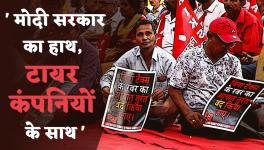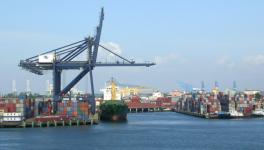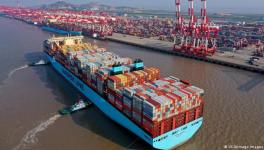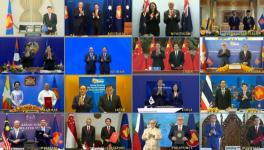Farmers to Stage Nationwide Protest Against RCEP on Nov 4

As the BJP-led Centre is all set to sign the Regional Comprehensive Economic Partnership (RCEP), a free trade agreement, with the inclusion of the agricultural sector, farmers across the country have called for a nationwide protest on November 4 against the government’s move.
RCEP consists of 16 countries including 10 ASEAN (Association of Southeast Asian Nations) countries and six others, India, China, Japan, South Korea, Australia and New Zealand. Once the agreement comes into effect, it will bring about 40%t of the world’s production and about 50% of world’s population under its purview.
On November 4, the day RCEP negotiations are expected to be concluded, farmers across the country will burn the copy of RCEP at district and lower administrative offices to mark their protest as per the call of All India Kisan Sangharsh Coordination Committee (AIKSCC), the largest platform of over 250 farmers’ organisations.
Appealing to the Modi government to desist from going ahead with the signing of the multilateral free trade agreement, AIKSCC has reiterated that due to anti-farmer and pro-corporate policies of the Government of India, Indian farmers are ill-prepared to compete in world markets.
“World over, governments have been heavily subsidising crop inputs and providing quality infrastructure to their farmers in order to maintain competitive prices of their produce. Indian government has not done that. In India, input prices are heavily taxed and farmers are not given profitable prices, resulting in heavy losses and farmer debts. RCEP will aggravate this crisis immensely,” AIKSCC said in a press statement.
Though the government is about to enter the trade agreement that would affect the livelihood of crores of Indian farmers, no draft of the negotiation text has been made public or even the state governments have not been consulted. Not only that, there has been no discussion in the Parliament on this issue so far.
“The RCEP, indeed any FTA of its kind, necessarily impinges on agriculture; and yet the states are not even consulted about its terms. It is a blatant and fundamental violation of the constitutional rights of the states that the Centre acts unilaterally in a sphere belonging to the state’s domain,” says eminent economist Prabhat Patnaik in one of his recent articles on RCEP.
Also read: Who Benefits from RCEP - the World’s Largest Free Trade Agreement?
AIKSCC has demanded that instead of signing the agreement on November 4, the government should make the provisional text of the agreement public and hold consultations with farmers, farm organisations, state governments and other stakeholders before taking a final decision.
Farmers across the country are apprehensive that RCEP is likely to hurt Indian agriculture and dairy sector in a way no other trade agreement have done so far. Till now, the general norm has been to keep agriculture out of Free Trade Agreements, a convention followed even in the ongoing EU-US free trade negotiations.
Through the RCEP, dairy industries of Australia and New Zealand will be able to capture the Indian market. New Zealand exports 93.4% of its milk powder, 94.5% butter and 83.6% cheese. At present, milk powder has 60% and fats have 40% tariffs. Removal of tariff would enable them to capture the market here affecting the livelihood of nearly 10 crore families engaged in the sector.
Farmers’ activists say that the impact of RCEP on Indian farmers is not limited to tariff alone. “The discussion about TRIPS (Trade-Related Aspects of Intellectual Property Rights)-Plus obligations on intellectual property rights poses a special danger on seed patents and breeding of animals. Also, plans may be afoot to give multi-national companies easier access to acquire agricultural land, bidding for government procurement of food-grains, investments in food processing and monopolising e-retail, which will further increase dependence of farmers on corporates who will reap huge profits at the cost of Indian peasants.”
Also read: RCEP: As Deadline Looms, Trade Unions Call Out Dangerous Causes
The country has already seen how ASEAN-India treaty through which the trade bloc’s members got an increased access to the Indian market for semi-processed and processed agricultural products, has impacted the market. Due to this treaty, farmers who cultivate wheat and cotton have been facing challenges from Australia and China.
While the import of palm oil places the oilseed producers at risk. Not only that liberal imports pepper, coconut, areca nut, tea, coffee, cardamom, rubber, etc. have also put the plantation producers under stress. Decline of plantation sector started with the Indo-Srilanka free trade agreement which had been signed in 1998 and came into force in 2000. The World Trade Organisation (WTO) agreement in April 2001, which removed the quantitative restrictions, further worsened the condition of Indian producers.
“RCEP would be the ASEAN FTA,” said Vijoo Krishnan of All India Kisan Sabha.
According to Vijoo Krishnan, “The presence of China, Australia, New Zealand and Japan in RCEP will also affect sericulture, horticulture as well as floriculture in India,” which had already been affected by the ASEAN treaty. ASEAN treaty has also pushed the seed industry, pharmaceuticals, small and medium industries and fisheries to trouble.
Also, imports of cheaper electronic and engineering goods from China could aggravate the problems in manufacturing sector which has already been facing crisis.
Along with the countrywide protests of AIKSCC, Kerala government will also organise a protest on November. Kerala is the worst hit state due to the crisis in the plantation sector.
Meanwhile, a research report from State Bank of India (SBI) cautions that India will reap benefits from RCEP only if it builds capabilities, otherwise there would be adverse impacts on domestic producers.
"India ran a merchandise trade deficit with 11 out of the 15 other RCEP members in 2018-19 totalling $107.28 billion. India's overall merchandise trade deficit was $184 billion in 2018-19", the report said.
The report added that in 2018-19, 34% of India's imports were from this region, while only 21% of exports went to this region.
"Considering segment-wise imports and exports, India runs trade surplus in agri and allied products, textiles, gems and jewellery. However, this is minuscule compared to our deficit in other commodities. There is also a lingering concern that even the small surplus in these segments might turn into a deficit once India becomes a part of RCEP", says Soumya Kanti Ghosh, group chief economic adviser, SBI.
Also read: India’s RCEP Dilemma: Is There a Way Out?
Get the latest reports & analysis with people's perspective on Protests, movements & deep analytical videos, discussions of the current affairs in your Telegram app. Subscribe to NewsClick's Telegram channel & get Real-Time updates on stories, as they get published on our website.
























